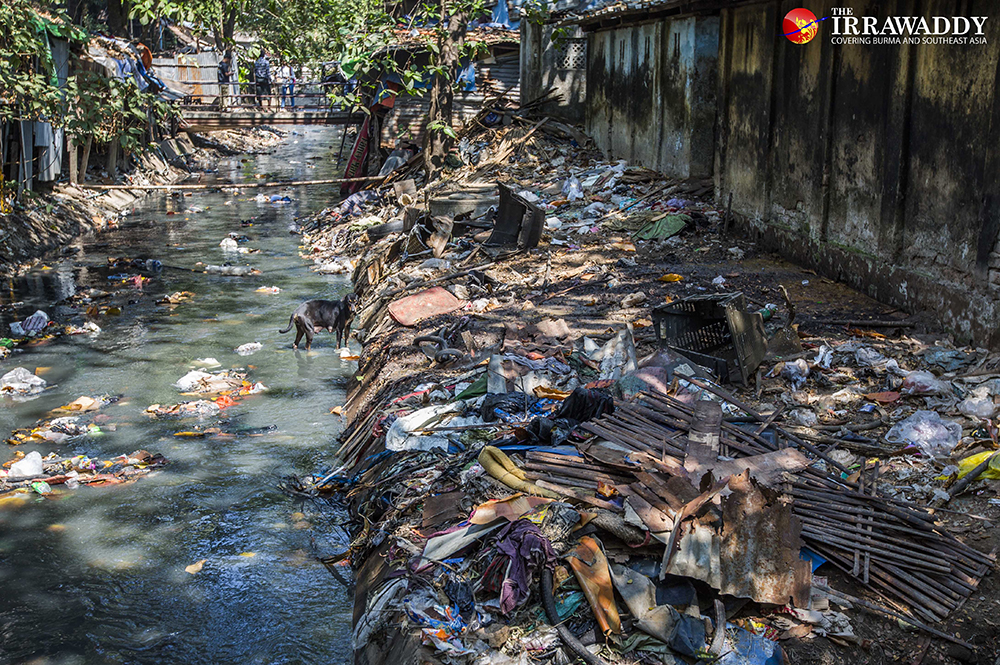YANGON—Around 400 volunteers led by Clean Yangon, an advocacy group dedicated to improving waste disposal in the commercial capital, cleaned out a heavily clogged drain near the city’s Theinbyu Market on Feb. 16—only to find photos of garbage piling up in the same drain going viral on social media the very next day.
The incident has prompted a serious discussion of the problem of littering, as well as shortcomings in the municipal garbage collection and drainage systems.
Supervisor Ko Zeya Tun of Clean Yangon recently talked to The Irrawaddy’s reporter Thazin Hlaing about municipal garbage disposal in Yangon and city residents’ attitudes toward garbage disposal.

What is your group’s goal in cleaning up garbage?
Our young volunteers are removing garbage that was not discarded by them. We are doing what we can in the hope that people who litter will feel ashamed of themselves when they see our efforts.
How many volunteers participated in removing rubbish from the drain near Theinbyu Market?
We cleaned it the first time on April 6, 2019, and again in February 2020. Over 400 people participated. Municipal workers also joined the campaign.
How did you feel when you heard that more garbage was seen in the drain the day after the clean-up?
We had to do a lot of preparation to clean the drain. We had to seek approval from authorities at different levels. And we had to recruit volunteers and arrange food and snacks for them. It started at around 7 a.m. and finished at around 11 a.m. It took four hours. It really stank. That drain was filled with all sorts of waste.
Volunteers from various age groups took part in the clean-up. But the following day, the garbage was back. We were sorry to see that; we’re concerned that other volunteers might be discouraged by this, or think that their efforts are in vain.
Do you know who dumped the garbage?
It is possible that it was thrown by nearby residents. But we don’t have evidence. We need to review the residential wards and apartments along the drain. It is important to review whether they have any difficulties disposing of their waste.
Garbage piled up again within 24 hours after we cleaned the drain. The waste we saw was mostly disposable foam containers and kitchen waste. So we think housewives are throwing them into the drain.
Some have suggested putting a covering on the drain. I don’t think there are sufficient funds to cover a drain that is 15 feet [4.5 meters] wide. I believe only showing responsibility and discipline can address this.
There must be differences between removing garbage from back alleys and clearing out drains. What are the difficulties?
On the street, you can see the garbage. But in drains, there are rotting dog corpses, old televisions, broken glass and broken jars. You can’t see them underwater. In some places, the water is knee deep. Going down into the drains is really risky.
There are various types of waste in there—from sanitary pads and feces to diapers—that pose a serious health hazard. Despite this, we volunteers took on the job for the sake of the cleanliness of our city.
What do you think of the Yangon City Development Committee (YCDC)’s garbage-disposal system?
From what I gather, the YCDC has been taking an active part in waste management lately, though there are weaknesses in some areas. I heard that, mainly because of littering, municipal workers are overstretched and there are budget constraints. If people didn’t litter and municipal workers didn’t need to collect litter, and if that manpower could be used in other places, then the municipal garbage collection system would be better.

As you participated in clearing rubbish out of the drains, how would you assess the conditions of Yangon’s drains?
Much of the city’s drainage system is uncovered. The water is stagnant and much remains to be done in that regard. If the water flowed properly, people would be reluctant to throw garbage into it. But as the garbage in the drains builds up over time, people begin to view the drains as dumpsites.
Civil society organizations alone will not be able to handle this. What do you think the government should do?
If the YCDC, which is mainly responsible for the city’s waste management, strictly enforced the rules—by, for example, imposing fines on people who litter in drains—the problem would not be this bad. However, imposing fines, I think, is a short-term solution. If the majority of people are responsible and abide by the rules and regulations, there would not be garbage in drains.
Do you think the problem is partly the result of the YCDC’s failure to properly enforce the laws?
The new YCDC Law was enacted in 2018. But the [specific] rules have not yet been adopted. And they say they can’t take legal action until the rules have been established.
As an ordinary citizen, I would like to know why the rules are not yet set out. I would like to know what difficulties there are in formulating rules. The majority of the people don’t know about the provisions [in the municipal law]. Only when they know the provisions, will they be able to take steps to follow them.
The YCDC should designate a period of, say, one to three months in which it will educate the public about the negative consequences of irresponsible dumping. If it properly enforces the law with strict penalties, this will address the problem to a certain extent, I think.
You may also like these stories:
Survey Finds Decade-High Numbers of Irrawaddy Dolphins
Myanmar Health Ministry Warns of Possible Coronavirus Outbreak as Global Toll Climbs
Blaze in Yangon’s Chinatown Injures 15

















